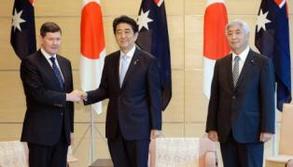 Tokyo Shimbun
Tokyo Shimbun The original Kyodo article is reproduced below in full (via the Tokyo Shimbun website):
安倍晋三首相は3日、オーストラリアのアンドリュース国防相と官邸で会談し、安全保障法制整備による自衛隊の任務拡大を念頭に防衛協力を強化する方針で一致した。北朝鮮の核・ミサイル問題や、中国の海洋進出など安保環境の変化を踏まえ、緊密に連携することも確認。
首相は「両国は、普遍的価値と戦略的利益を共有する『特別な関係』だ。その関係をますます強固なものにしていきたい」と強調。両国の防衛協力について「両国の国益のみならず、地域の平和と安定に大きく寄与するものだ」と指摘した。アンドリュース氏は「2国間のみではなく、日米豪3カ国の協力も大変重要だ」と応じた。
(Translation: Prime Minister Shinzo Abe held discussions with Australian Defence Minister Andrews on the 3rd at the Prime Ministerial Residence. Both sides agreed to strengthen policies on defence cooperation, while keeping in mind an expansion in the activities of the SDF as a result of reform of security legislation. Both sides also confirmed that they would remain in close consultation regarding North Korea’s nuclear and missile programs, China’s maritime foray and changes in the regional security environment, among others.
PM Abe emphasised that “Both countries have a ‘special relationship’ encompassing shared values and strategic interests. I would like to further strengthen this relationship”. In regard to defence cooperation between both countries, PM Abe indicated that “This is not only for the benefit of both countries, but will make a significant contribution to the peace and stability of the region”. In response, Minister Andrews said “Not only bilateral, but trilateral cooperation is vital between Japan, the US, and Australia”.)
While this appears to be a standard response to questions regarding Australia-Japan defence ties, the statement by PM Abe that he wants to ‘further strengthen’ the relationship should be taken as an indication that cooperation between both nations is about to be stepped up. Following last week’s Shangri-La Dialogue, in which Australia and Japan’s positions on China’s island building in the South China Sea were virtually identical, one can assume that this level of shared concern will translate into further exercises involving the SDF and ADF, with the ADF possibly going to Japan to learn more of the SDF’s capabilities and procedures.
Yet this is not the only area that caught my attention this week. Another concerned the behaviour of PM Abe during questioning from opposition parties earlier this week as part of the Diet’s debate on Japan’s security laws (J). Apparently PM Abe was a little more bellicose than opposition members were prepared to tolerate, answering questions directed at Defence Minister Nakatani despite no request to do so, and heckling the opposition with “Hurry up and ask your question!” when members took longer than expected to make a point. Naturally this then resulted in a wave of heckling from the opposition seats directed at PM Abe and brought all questions to a halt.
In terms of parliamentary behaviour, especially when compared to that of other parliaments around the world, it was hardly out of line, and certainly wouldn’t batter an eyelid in Australia’s often terse political debates. Yet it has raised the heckles of left-wing newspapers in Japan, who regard it as evidence of PM Abe’s ‘arrogance’ and evasiveness when it comes to questions on collective self defence. While Abe is no ‘innovator’ in terms of riling up the opposition (PMs Nakasone and Koizumi were also quite deft at it), it is far more ‘civil’ than past behaviour exhibited in the Diet, where physical tussles between members over legislation is not unknown, as demonstrated by this video (skip to 0:13)
 RSS Feed
RSS Feed